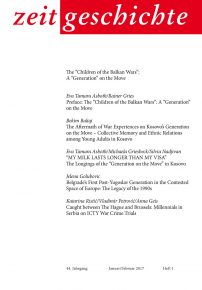zeitgeschichte 1/17
"Children of the Balkan Wars": A "Generation" on the MoveThe „Children of the Balkan Wars“ were born in the late 1980s or early 1990s in Yugoslavia, which at that time was a country shaken by conflicts and crises. They experienced the so-called „national awakenings“ and the militarization of the nations in the newly established countries of former Yugoslavia. They spent their youth in postwar societies as well as in post-socialist societies: Meanwhile, the „Children of the Balkan Wars“ have grown into young adults between the ages of twenty and thirty years and they now have to confront an elementary challenge that is overshadowed by their past and the political concerns of the rest of the European Union. They have the responsibility to design and achieve the forthcoming EU-integration of their countries in times when a common European future is highly uncertain.
This issue of the journal zeitgeschichte shall be understood as a first approach of interdisciplinary research to examine the „Generation on the Move“. Their understanding of self and of world images, of their past, present and future perspectives, as well as their understanding of politics between nationalism and Europeanness will be analyzed.
Sie sehen gerade einen Platzhalterinhalt von Vimeo. Um auf den eigentlichen Inhalt zuzugreifen, klicken Sie auf die Schaltfläche unten. Bitte beachten Sie, dass dabei Daten an Drittanbieter weitergegeben werden.
Mehr InformationenSie sehen gerade einen Platzhalterinhalt von YouTube. Um auf den eigentlichen Inhalt zuzugreifen, klicken Sie auf die Schaltfläche unten. Bitte beachten Sie, dass dabei Daten an Drittanbieter weitergegeben werden.
Mehr InformationenSie müssen den Inhalt von reCAPTCHA laden, um das Formular abzuschicken. Bitte beachten Sie, dass dabei Daten mit Drittanbietern ausgetauscht werden.
Mehr InformationenSie sehen gerade einen Platzhalterinhalt von Facebook. Um auf den eigentlichen Inhalt zuzugreifen, klicken Sie auf die Schaltfläche unten. Bitte beachten Sie, dass dabei Daten an Drittanbieter weitergegeben werden.
Mehr InformationenSie sehen gerade einen Platzhalterinhalt von Instagram. Um auf den eigentlichen Inhalt zuzugreifen, klicken Sie auf die Schaltfläche unten. Bitte beachten Sie, dass dabei Daten an Drittanbieter weitergegeben werden.
Mehr InformationenSie sehen gerade einen Platzhalterinhalt von X. Um auf den eigentlichen Inhalt zuzugreifen, klicken Sie auf die Schaltfläche unten. Bitte beachten Sie, dass dabei Daten an Drittanbieter weitergegeben werden.
Mehr Informationen

